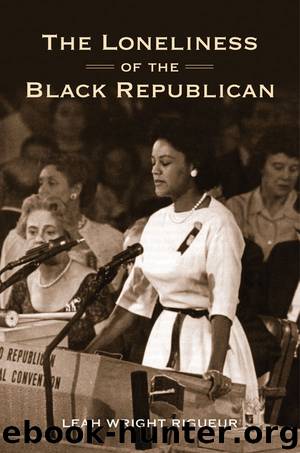The Loneliness of the Black Republican by Leah Wright Rigueur

Author:Leah Wright Rigueur
Language: eng
Format: epub
Publisher: Princeton University Press
FROM THE FRINGE TO THE MAINSTREAM
While appearing on ABC’s Issues and Answers on Sunday November 4, 1973, Edward Brooke became the first Republican in Congress to call for Richard Nixon’s resignation. The black politician “reluctantly” suggested that the president had been involved somehow in the Watergate scandal and as a result had lost both his “effectiveness as the leader” of the country and the trust of the American public. Ten days later, as the president’s favorability rating plummeted, Brooke would again urge the president to resign, this time much more forcefully during a face-to-face meeting with Nixon at the White House. Over the course of the next nine months, party officials and leaders from every wing of the party would come to echo Brooke’s demand; by the time Nixon announced his resignation on August 8, 1974, the president was practically a political pariah, shunned by the American people and distrusted by many within his own party.97
Over the span of two years, Watergate—initially a bizarre political debacle that began with a June 1972 break-in of the Democratic National Committee (DNC) headquarters—had evolved into a bloated, nightmarish fiasco for the Republican Party and Richard Nixon. Surveys from November 1973 indicated that more than two-thirds of Americans believed that the president was involved in some aspect of the Watergate break-in or subsequent cover-up, while a Harris poll from that same month indicated that the scandal had erased any gains made by Nixon among voters in the 1972 election. Gone was his dream of realignment, as more than half of the nation’s voting electorate remained firmly ensconced in the Democratic Party fold.98
A low point for the modern Republican Party, the administration’s widespread involvement in political malfeasance bolstered African Americans’ already negative perceptions of the president and the party. “There was little sadness in America’s Black communities” over Nixon’s departure, wrote the editors of Jet about two weeks after the president resigned, especially since the White House’s dogged attempt to placate the country’s white voters had undermined the few “bright” accomplishments of the administration. Black Republicans made similar observations, arguing that Watergate was irrelevant to their agenda, since the relationship between African Americans and the president was already so grim. “A black Republican campaigning in a predominately black district is campaigning before people who are not surprised at all by … Watergate,” mused Arthur Fletcher in March 1974. “They have been the victims of all kinds of political shenanigans … on the other hand, the white candidate is confronted with it because Watergate seems to have embarrassed the kind of idealism that much of white America has allowed itself to believe existed in our political system.” Elaine Jenkins offered a far more brusque assessment: “Watergate,” she stated a month before the president’s resignation, “is a white man’s fight.”99
These claims were an acknowledgment not only of the rancor that persisted between Nixon and African Americans but also of the estrangement that existed between black Republicans, the administration, and white party officials. Thus blacks in the GOP
Download
This site does not store any files on its server. We only index and link to content provided by other sites. Please contact the content providers to delete copyright contents if any and email us, we'll remove relevant links or contents immediately.
| Anarchism | Communism & Socialism |
| Conservatism & Liberalism | Democracy |
| Fascism | Libertarianism |
| Nationalism | Radicalism |
| Utopian |
The Secret History by Donna Tartt(19052)
The Social Justice Warrior Handbook by Lisa De Pasquale(12187)
Thirteen Reasons Why by Jay Asher(8893)
This Is How You Lose Her by Junot Diaz(6877)
Weapons of Math Destruction by Cathy O'Neil(6264)
Zero to One by Peter Thiel(5786)
Beartown by Fredrik Backman(5737)
The Myth of the Strong Leader by Archie Brown(5499)
The Fire Next Time by James Baldwin(5431)
How Democracies Die by Steven Levitsky & Daniel Ziblatt(5215)
Promise Me, Dad by Joe Biden(5141)
Stone's Rules by Roger Stone(5081)
A Higher Loyalty: Truth, Lies, and Leadership by James Comey(4954)
100 Deadly Skills by Clint Emerson(4921)
Rise and Kill First by Ronen Bergman(4779)
Secrecy World by Jake Bernstein(4741)
The David Icke Guide to the Global Conspiracy (and how to end it) by David Icke(4706)
The Farm by Tom Rob Smith(4502)
The Doomsday Machine by Daniel Ellsberg(4484)
